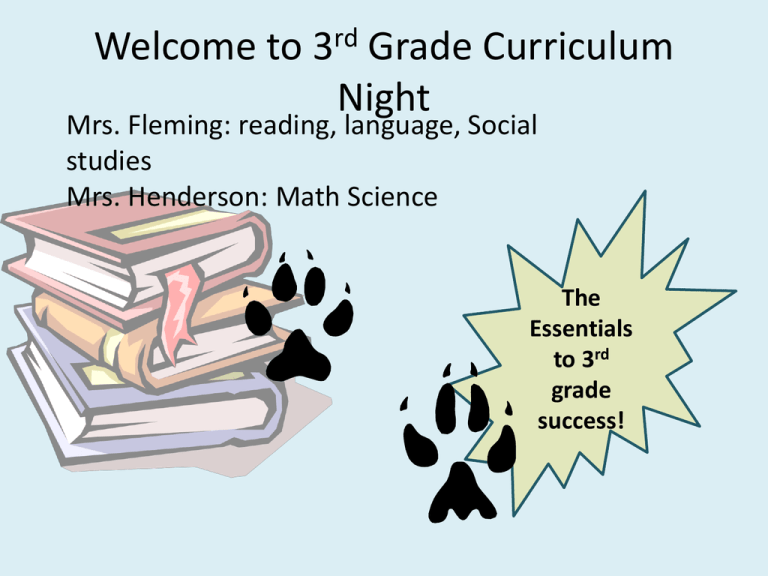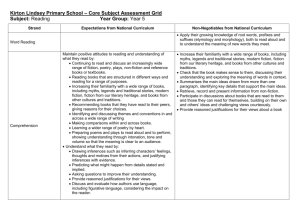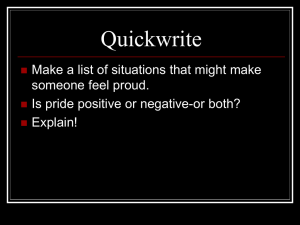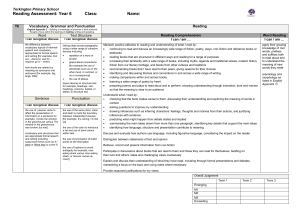Welcome to 3rd Grade Curriculum Night
advertisement

Welcome to 3rd Grade Curriculum Night Mrs. Fleming: reading, language, Social studies Mrs. Henderson: Math Science The Essentials to 3rd grade success! Cliff Notes You received a paper in this week’s Tuesday folder with most all our classroom polices and procedures. • Homework – Must be turned in on time for full credit. This is under work habit traits on the report card. Homework supports learning in the class room. All math homework is corrected together in class for reinforcement. • Attendance: We need all students present in the classroom by 8 AM to maximize learning time. Arriving at the 8:20 tardy bell takes away from organization and prep time. Students often feel rushed and not ready if they arrive to the class after announcements. • Tuesday Folders – We will faithfully send them home on Tuesday. Please look over the card, sign and return Wednesday. Keep all the papers. Check for “Sign and Return”. You may leave comments on the back of the card OR email your questions. A signed T. folder card is taken as a weekly homework grade. • .. Go to Slide show view show to click on blue hyperlinks. Nurtured Heart – Behavior Expectations Kreinhop is all in for the Nurtured Heart Approach. What does that mean? • We’re looking for greatness and we will give statements of greatness by giving Specific Precise Praise. “Good Job” is not good enough. – I see that you are taking your learning seriously by staying on task and showing your work! • No means No. Behaviors that inhibit learning or the learning of others will be “Reset”. This is a short “time out” and students are welcomed in quickly. Resets will affect behavior grades. • In our rooms we have TOP NOTCH students and class awards “minutes to win it” as evidence of student greatness. • Brag bands… attempting to give away one a day. Notching UP, the Nurtured Heart Approach by Howard Glasser Math-Must Dos Third Grade Curriculum is deeper and wider than previous years. Here are a few absolutes to have a successful year in math. • Reflexmath 4 to 6 days per week for 20 minutes or until the “green light”. It is a state expectation that students reach “automaticity” with addition subtraction facts and multiplication facts through 10x10. • Multiple Step problems is another expectation that is being assessed through the state assessment. We use the Singapore Model Drawing approach to help. I have a link on my homework page and through this slide. Students also will have the steps in their Problem of the Day book. • Tonight you will receive a hand out of all the student expectations for the whole year. • Financial Literacy is new to Texas this year. • Last year’s test is now released on the T.E.A. website. Math-Must Dos • 1st Quarter Essentials for math: a. Read, Write and order whole numbers to 999,999. This looks like Standard Form 345,612 Expanded Form 300,000 +40,000 +5,000+ 600+10+2 Word Form Three hundred forty-five thousand, six hundred twelve You can use playing cards are Uno cards to form numbers at home and read them. Try finding large numbers in the newspaper, Google maps or other non-fiction print. b Compare and order whole numbers to 999,999. We start from the largest place and compare to the right. Something is bigger than nothing. 65, 809 ______ 9,890 890 < 1,259 c. Fractions: create and then order fractions with these denominators: half, third, fourth, sixth, eighth, tenths c. Addition and Subtraction Facts must be mastered to Automaticity. Counting on fingers, toes or head nodding is not a mastered fact. Let’s look at some data from Reflexmath. d. Addition and Subtraction with regrouping – we don’t say borrow any more . e. Rounding to the nearest 10; 100; 1,000; 10,000; 100,000. The place to the right determines which way to round. 452 to the nearest 100. the Tens place tells the hundreds to go up. 238, the tens place tells the hundreds to stay. Science Vocabulary will be key in science. Students are expected to retain and maintain skills learned in kindergarten through 5th grade for their state test. Science is fun and we will be hands on 1 to 2 times a week. Big the 1st Quarter: • Safety rules. •Tools we use •Scientific Method •Matter – states of matter and what happens when you add heat. •Mixtures – yum! •Forms of energy We will get acquainted with our science book and the online resources. We do not have access to Stemscopes this year. We will use studyjams and explorelearning.com on occasion as well as brainpopjr. Reading Essentials Third Grade Curriculum is deeper and wider than previous years. Here are a few absolutes to have a successful year in Reading. • Read : 30 minutes every night to build fluency, vocabulary, and comprehension. • Complete: the Reading Log. • Discuss: ask your child to talk about the book they just read. This way there is accountability and your child will understand that they must think about their book. • Discussion Ideas for Fiction: retell the story, make connections (text-to-self, text-to-text), sequence the plot, and identify the problem and resolution. • Discussion Ideas for Nonfiction: identify details/facts that you have learned, identify the main idea, use evidence in the text to draw conclusions, and talk about questions that you still have about the topic. Third Grade Student Learning Targets 1st 9 Weeks I Can . . . Questioning Generate questions about the texts I have read. (fig. 19C) Determining Importance Identify details or facts that support the main idea. (3.13A) Inferences (fiction) Make inferences about text and use text evidence to support understanding in fiction texts. (fig. 19D) Third Grade Student Learning Targets 1st 9 Weeks I Can . . . Inferences (non-fiction) Make inferences and draw conclusions from the facts presented in text and support those inferences with text evidence. (3.13B) Setting ( When & Where) Plot/Problem/ & Resolution Summarize/sequence the plots main events and explain the resolution of the story. (3.8A)


